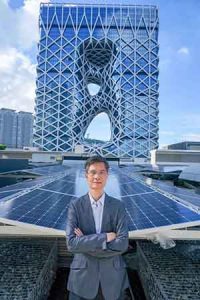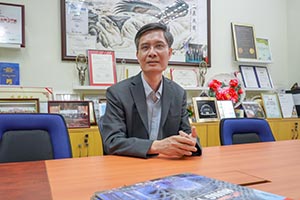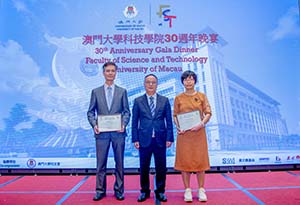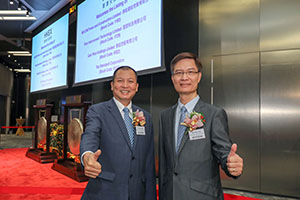If a designer is someone who designs your dream home, then an engineer is the person who turns that dream blueprint into an actual house.
Sou Kun Tou, an alumnus of the University of Macau (UM), is such a ‘dream builder’.After graduating from UM in 2002 with a master’s degree in electromechanical engineering, Sou worked in the private and public sectors, in both engineering and management positions. He is currently the council president of the Macao Institution of Electrical and Mechanical Engineers as well as the executive director and CEO of a construction company, which became listed in the Hong Kong Stock Exchange in 2018. Looking back, Sou says there are no shortcuts to success; it all hinges on whether one can seize the opportunities that arise.
Choosing to Stay in Macao
After graduating from Huaqiao University in 1988 with a bachelor’s degree in precision mechanical engineering, Sou became an assistant engineer at Macao Water. At the time, in an effort to train bilingual language professionals, the Macao government launched a series of programmes to sponsor qualified applicants from Macao to study in Portugal. Sou applied to the programme and was selected. However, after much consideration, he decided to stay in Macao to gain more practical work experience.
In 1997, UM launched a master’s degree programme in electromechanical engineering in an effort to cope with the demand for a new type of professionals. Sou immediately enrolled in the programme, hoping to upgrade his knowledge so that he could become a registered electromechanical engineer some day. But he soon encountered a huge challenge. ‘The rest of the students were all much younger than me. Most of them were fresh graduates from college, so studying theories was a breeze for them,’he explains. ‘I was the only working student in the class, so it was very difficult to juggle a full-time job and the academic commitments.’ So how did he overcome that challenge? He says, ‘I had to bite the bullet and get used to it.
So far, several programmes offered by the Faculty of Science and Technology (FST) have received full accreditation from the Hong Kong Institution of Engineers (HKIE). These include the Bachelor of Science in Electromechanical Engineering, Bachelor of Science in Civil Engineering, Bachelor of Science in Electrical and Computer Engineering, and Bachelor of Science in Computer Science. Students starting these programmes from the 2011/2012 academic year onwards are eligible to apply for HKIE membership upon graduation to receive professional qualifications that are recognised worldwide. Sou says because English is the main medium of instruction at UM, his English improved greatly during his postgraduate study at UM. ‘After graduation from UM, I was able to confidently negotiate business deals with foreigners in English. Apart from professional knowledge, I think English proficiency is the biggest gain from my postgraduate studies at UM,’ he says.
Currently an external member of the Advisory Committee of the Department of Electromechanical Engineering, Sou meets regularly with faculty members from the department to discuss the planning of the academic programmes. He points out that faculty members in the department always keep their finger on the pulse of the changing society to ensure that the programmes meet the needs of the market. For this reason, graduates from the department are always in great demand.
Don’t Let Any Opportunity Pass You By
Before Macao’s handover to China, the construction industry in Macao was sluggish. In 1994, with six yearsof experience at Macao Water and private companies under his belt, Sou decided to join the Leal Senado (the Municipal Council of Macao), the predecessor of the current Institute for Municipal Affairs (IAM). It was only after the liberalisation of the Macao casino monopoly following the city’s return to China, and the subsequent construction of various large-scale integrated resorts, that the demand for professionals in the construction industry took off. Having accumulated experience in both the government and the private sector, Sou decided it was the right time to start his own business. So in 2006, he left his government job as the head of the equipment section of the IAM and founded a company with his partner.
Initially, the company focused on electromechanical engineering projects, but what really established its reputation in the industry was a structural steel project. One day, a friend asked Sou if he was interested in undertaking a structural steel project for an integrated resort. At the time, his company did not have as much experience in structural steel projects as it did in electromechanical engineering projects, and the deadline set by the client was very tight. However, Sou was hesitant to let the opportunity slip by, so he said yes without knowing whether he could pull it off. Fortunately, his team managed to complete the project on time, earning his company several more projects from the satisfied client. ‘If I could offer a piece of advice to anyone who hopes to start his own business some day, I would say this: Don’t set limits on yourself. Don’t just do things that you like or are good at, because that way you shut the door on a lot of opportunities,’ says Sou. His company is now involved in many large-scale projects in Macao, and what he is most proud of is the steel structure his company built for the world’s first free-form exoskeleton high-rise.
There Are Always Untapped Niches
Pointing at a just-renovated lift, Sou says, ‘There is a high degree of continuity in electromechanical engineering, in the sense that the completion of each project only marks the beginning of a long process of maintenance and repair, which involves a lot of manpower and resources. So there are always untapped niches in this industry.’
For students who wish to pursue a career in electromechanical engineering, he offers these words of advice: ‘You must be able to deal with different expectations from different parties. For instance, Party A may want you to finish the project on schedule, but Party B asks you to pay attention to safety. Then Party C requests you to keep the cost down. It’s a lot of pressure, and a rookie may not be able to handle such pressure.’ As an employer, Sou believes attitude trumps everything, saying that a main predictor of a person’s potential to become successful in this industry is the ability and willingness to learn and do things beyond his or her duty.
Earlier this year, Sou received the Outstanding Alumni Award from the FST, in recognition of his outstanding achievements in the electromechanical engineering industry. He is grateful to his alma mater UM for the education provided by the institution. He attributes his success to his willingness to work hard without caring about short-term gains. Maybe it sounds clichéd, but it indeed reflects the personal philosophy by which Sou lives his life.
如果說設計師的工作是描繪夢想的藍圖,工程師就是將夢想實體化的「築夢師」。獲澳門大學科技學院頒授傑出校友獎的蘇冠濤正是一位這樣的築夢師。蘇冠濤2002年獲澳門大學機電工程碩士學位,過去曾在私人公司、公共事業機構和政府部門任職工程師及管理層要職,目前是一家上市建設公司的執行董事兼行政總裁。回望一路走來,他說成功沒有捷徑,全憑緊握機會。
選擇留澳發展
蘇冠濤1988年於華僑大學完成精密機械工程學士學位後,便在澳門自來水股份有限公司擔任助理工程師。時值政府展開一系列赴葡就讀計劃,培養具中葡雙語能力的接班人,蘇冠濤曾報名參加計劃並入選。但最後他選擇不到葡萄牙,希望趁年輕留在澳門的企業裡汲取實務經驗。
澳大於1997年開設首屆機電工程碩士課程,力求上進的蘇冠濤得悉後便馬上報讀,希望增值自己之餘,亦希望課程有助他獲取註冊機電工程師的資格。蘇冠濤重回校園初期就遇上了一大難題,「同學都非常年輕,他們才剛從大學畢業,對理論駕輕就熟,反觀自己是班上唯一的在職人士,面對繁重的課業相當吃力。」他當時是如何克服困難?他說:「咬緊牙關堅持下去,習慣了就好。」
目前,除了機電工程理學士學位外,科技學院的土木工程理學士學位、電機及電腦工程理學士學位、計算機科學理學士學位均獲廣泛認可,上述學位已正式通過香港工程師學會的全面學術評鑑。自2011/2012學年起入讀上述課程的學生,畢業後有資格申請成為香港工程師學會會員,從而取得世界認可的專業資格。蘇冠濤說,澳大主要以英語授課,他在攻讀研究生期間,英語也不經不覺進步了很多。「畢業後,我與外國人談生意時能夠自信地以英語交流,這是我讀研時除專業知識以外的最大得著。」蘇冠濤目前是機電工程系諮詢委員會外部顧問,定期與澳大討論該系的課程規劃。蘇冠濤指澳大一直瞭解社會變化及行業要求,課程十分切合業界需求,認受性很強。
看準時機 把握機會
回歸前澳門的建造業不太景氣,已在自來水公司及私人公司工作約六年,累積了一定經驗的蘇冠濤於1994年決定加入澳門市政廳(市政署前身)。直至澳門回歸初期博彩業開放,多個大型綜合度假村相繼動工,社會對建造業人才需求殷切。這時的蘇冠濤既有私人公司經驗,亦熟悉政府運作,是創業的時機,於是他在2006年離開公職,與拍檔攜手創業。他離任時職位是設備處處長,離開前更獲頒發表揚狀,嘉許他任職期間的專業才幹。
蘇冠濤的公司初期業務以機電工程為主,後來卻憑鋼結構工程打出名堂。蘇冠濤說:「創業很重要的一點,就是不能規限自己,不能因為只做自己喜歡或擅長的事,而將其他機會拒諸門外。」目前,澳門不少大型工程蘇冠濤都有參與,其中他最引以為傲的是參與建設座落於澳門的全球首座自由形態外骨骼結構摩天大樓的鋼結構工程。
永遠有發展空間
訪問期間,蘇冠濤帶記者去到摩天大樓剛翻新的電梯說:「機電工程有十分強的連貫性。每項工程完成後,其實需要很多人力物力維修保養,所以這一行永遠有發展空間。」
蘇冠濤以過來人身分,寄語有意投身機電工程界發展的學生:「你要習慣同一時間面對來自不同人的不同要求:這個人要你準時完工,那個人要你注意工程安全,又有人要你控制成本,剛入行的新人未必受得了這麼大的壓力。」他在招聘時會問應徵者「是否能忍受被罵?」因為這一行要顧慮的方面實在太多。他又說判斷新人是否一名可造之才,主要靠觀察他們是否主動學習及承擔工作,工作態度勝於一切。
今年,蘇冠濤獲澳大科技學院頒授傑出校友獎,表揚他在機電工程界的傑出成就。他感謝母校的栽培和對自己的肯定,又指自己今天的成就,來自肯付出、不怕吃虧的態度。乍聽是老生常談,但確實體現了這位築夢師的人生哲學。

UM alumnus and engineer Sou Kun Tou, who is the executive director and CEO of a publicly list construction company
澳門大學校友、上市建設公司的執行董事兼行政總裁蘇冠濤工程師

Sou Kun Tou says that UM’s Department of Electromechanical Engineering offers academic programmes that answer the needs of the industry
蘇冠濤指澳大機電工程系的課程十分切合業界需求

Sou Kun Tou (left) and Yang Yan (right) receive the Outstanding Alumni Award from UM Rector Yonghua Song
澳大校長宋永華向蘇冠濤(左)及另一位校友楊燕(右)頒授傑出校友獎

Sou Kun Tou and his partner Robby Kwok at Hong Kong Stock Exchange on the day their company became listed
公司上市當日,蘇冠濤與拍擋郭林錫在香港交易所合照。

